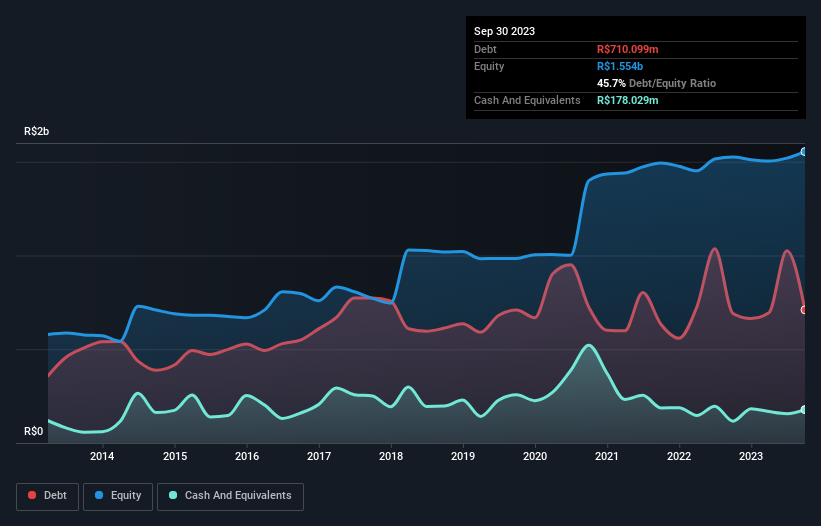- Brazil
- /
- Healthcare Services
- /
- BOVESPA:PFRM3
These 4 Measures Indicate That Profarma Distribuidora de Produtos Farmacêuticos (BVMF:PFRM3) Is Using Debt Extensively

Warren Buffett famously said, 'Volatility is far from synonymous with risk.' So it seems the smart money knows that debt - which is usually involved in bankruptcies - is a very important factor, when you assess how risky a company is. We note that Profarma Distribuidora de Produtos Farmacêuticos S.A. (BVMF:PFRM3) does have debt on its balance sheet. But the more important question is: how much risk is that debt creating?
Why Does Debt Bring Risk?
Debt is a tool to help businesses grow, but if a business is incapable of paying off its lenders, then it exists at their mercy. If things get really bad, the lenders can take control of the business. However, a more frequent (but still costly) occurrence is where a company must issue shares at bargain-basement prices, permanently diluting shareholders, just to shore up its balance sheet. Of course, the upside of debt is that it often represents cheap capital, especially when it replaces dilution in a company with the ability to reinvest at high rates of return. The first thing to do when considering how much debt a business uses is to look at its cash and debt together.
See our latest analysis for Profarma Distribuidora de Produtos Farmacêuticos
What Is Profarma Distribuidora de Produtos Farmacêuticos's Net Debt?
The chart below, which you can click on for greater detail, shows that Profarma Distribuidora de Produtos Farmacêuticos had R$710.1m in debt in September 2023; about the same as the year before. However, because it has a cash reserve of R$178.0m, its net debt is less, at about R$532.1m.

A Look At Profarma Distribuidora de Produtos Farmacêuticos' Liabilities
The latest balance sheet data shows that Profarma Distribuidora de Produtos Farmacêuticos had liabilities of R$2.43b due within a year, and liabilities of R$706.9m falling due after that. Offsetting this, it had R$178.0m in cash and R$1.71b in receivables that were due within 12 months. So it has liabilities totalling R$1.25b more than its cash and near-term receivables, combined.
This deficit casts a shadow over the R$604.5m company, like a colossus towering over mere mortals. So we'd watch its balance sheet closely, without a doubt. At the end of the day, Profarma Distribuidora de Produtos Farmacêuticos would probably need a major re-capitalization if its creditors were to demand repayment.
We measure a company's debt load relative to its earnings power by looking at its net debt divided by its earnings before interest, tax, depreciation, and amortization (EBITDA) and by calculating how easily its earnings before interest and tax (EBIT) cover its interest expense (interest cover). The advantage of this approach is that we take into account both the absolute quantum of debt (with net debt to EBITDA) and the actual interest expenses associated with that debt (with its interest cover ratio).
While Profarma Distribuidora de Produtos Farmacêuticos has a quite reasonable net debt to EBITDA multiple of 2.0, its interest cover seems weak, at 1.6. This does have us wondering if the company pays high interest because it is considered risky. In any case, it's safe to say the company has meaningful debt. Profarma Distribuidora de Produtos Farmacêuticos grew its EBIT by 4.7% in the last year. That's far from incredible but it is a good thing, when it comes to paying off debt. There's no doubt that we learn most about debt from the balance sheet. But it is Profarma Distribuidora de Produtos Farmacêuticos's earnings that will influence how the balance sheet holds up in the future. So when considering debt, it's definitely worth looking at the earnings trend. Click here for an interactive snapshot.
Finally, while the tax-man may adore accounting profits, lenders only accept cold hard cash. So the logical step is to look at the proportion of that EBIT that is matched by actual free cash flow. In the last three years, Profarma Distribuidora de Produtos Farmacêuticos's free cash flow amounted to 33% of its EBIT, less than we'd expect. That weak cash conversion makes it more difficult to handle indebtedness.
Our View
On the face of it, Profarma Distribuidora de Produtos Farmacêuticos's interest cover left us tentative about the stock, and its level of total liabilities was no more enticing than the one empty restaurant on the busiest night of the year. Having said that, its ability to grow its EBIT isn't such a worry. We should also note that Healthcare industry companies like Profarma Distribuidora de Produtos Farmacêuticos commonly do use debt without problems. We're quite clear that we consider Profarma Distribuidora de Produtos Farmacêuticos to be really rather risky, as a result of its balance sheet health. So we're almost as wary of this stock as a hungry kitten is about falling into its owner's fish pond: once bitten, twice shy, as they say. When analysing debt levels, the balance sheet is the obvious place to start. However, not all investment risk resides within the balance sheet - far from it. For example, we've discovered 4 warning signs for Profarma Distribuidora de Produtos Farmacêuticos that you should be aware of before investing here.
If, after all that, you're more interested in a fast growing company with a rock-solid balance sheet, then check out our list of net cash growth stocks without delay.
If you're looking to trade Profarma Distribuidora de Produtos Farmacêuticos, open an account with the lowest-cost platform trusted by professionals, Interactive Brokers.
With clients in over 200 countries and territories, and access to 160 markets, IBKR lets you trade stocks, options, futures, forex, bonds and funds from a single integrated account.
Enjoy no hidden fees, no account minimums, and FX conversion rates as low as 0.03%, far better than what most brokers offer.
Sponsored ContentNew: Manage All Your Stock Portfolios in One Place
We've created the ultimate portfolio companion for stock investors, and it's free.
• Connect an unlimited number of Portfolios and see your total in one currency
• Be alerted to new Warning Signs or Risks via email or mobile
• Track the Fair Value of your stocks
Have feedback on this article? Concerned about the content? Get in touch with us directly. Alternatively, email editorial-team (at) simplywallst.com.
This article by Simply Wall St is general in nature. We provide commentary based on historical data and analyst forecasts only using an unbiased methodology and our articles are not intended to be financial advice. It does not constitute a recommendation to buy or sell any stock, and does not take account of your objectives, or your financial situation. We aim to bring you long-term focused analysis driven by fundamental data. Note that our analysis may not factor in the latest price-sensitive company announcements or qualitative material. Simply Wall St has no position in any stocks mentioned.
About BOVESPA:PFRM3
Profarma Distribuidora de Produtos Farmacêuticos
Engages in the distribution of pharmaceutical products in Brazil.
Solid track record with excellent balance sheet and pays a dividend.


